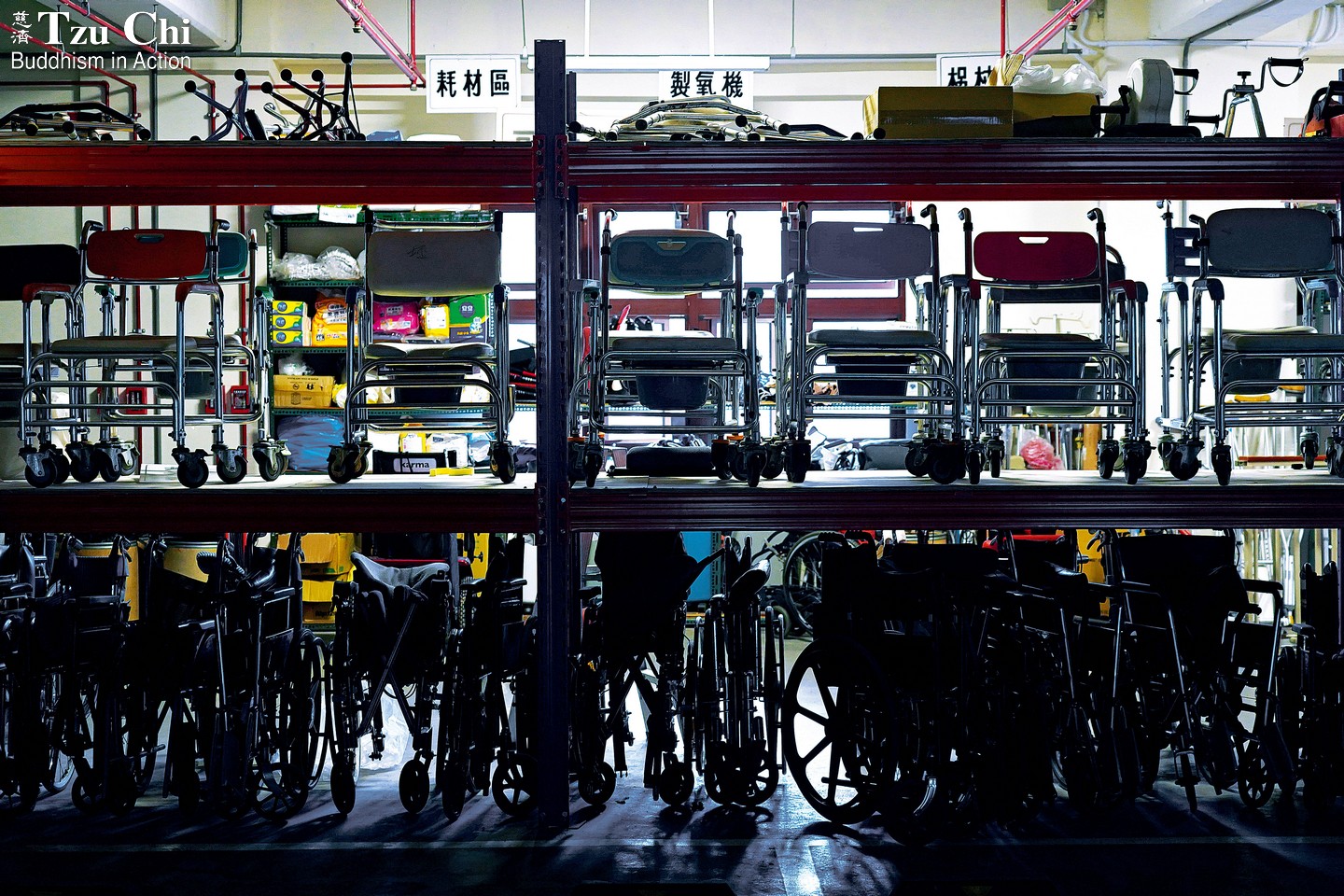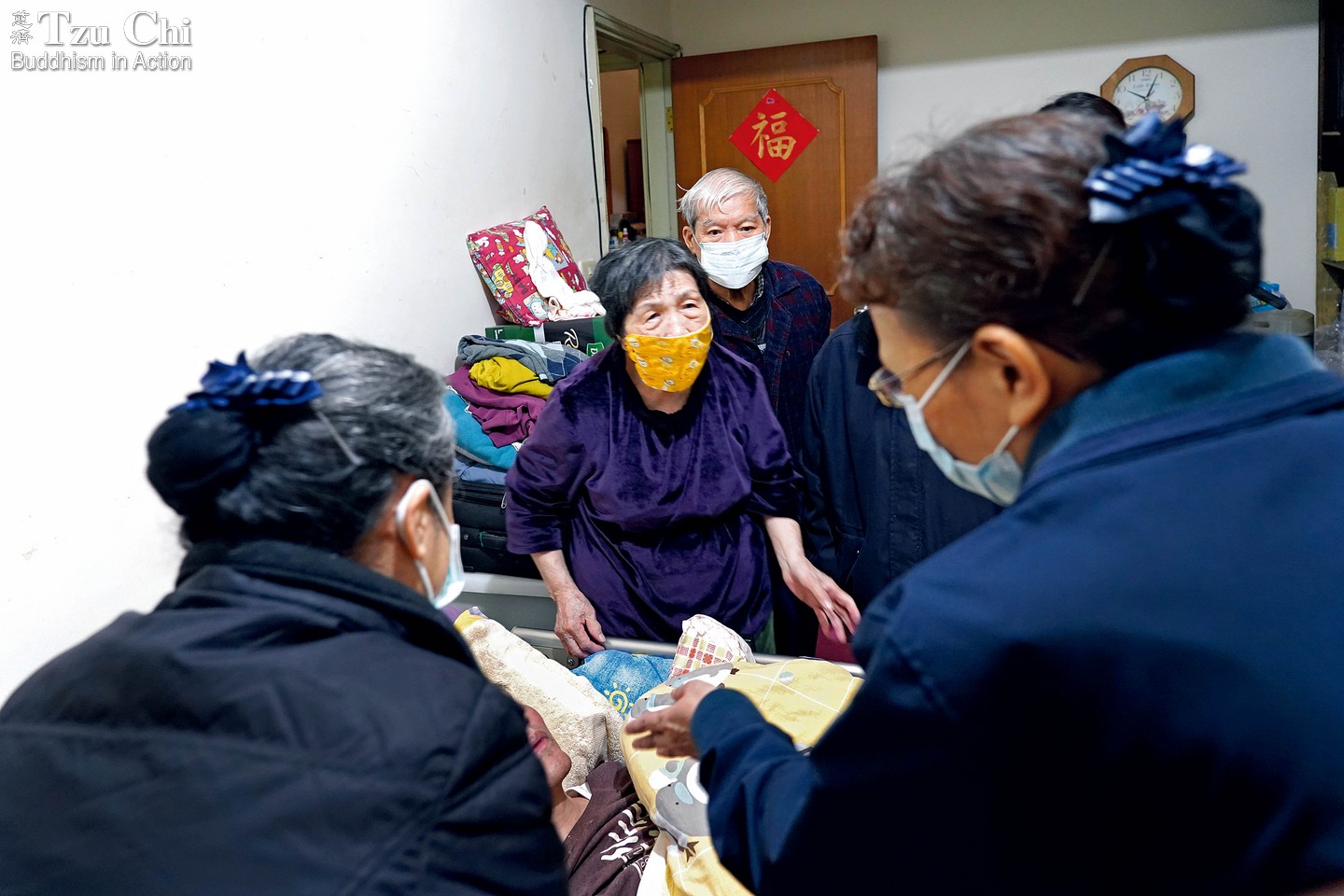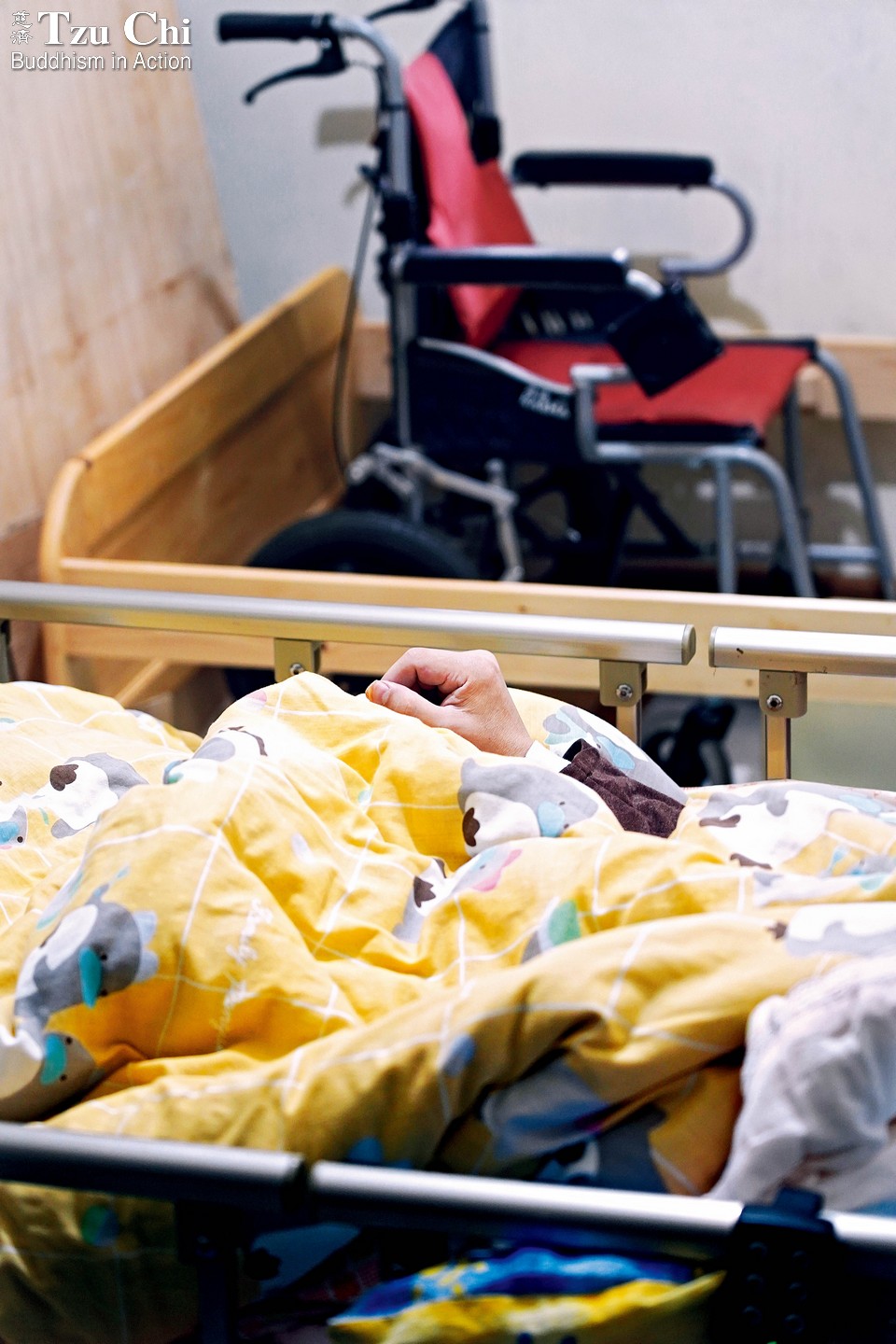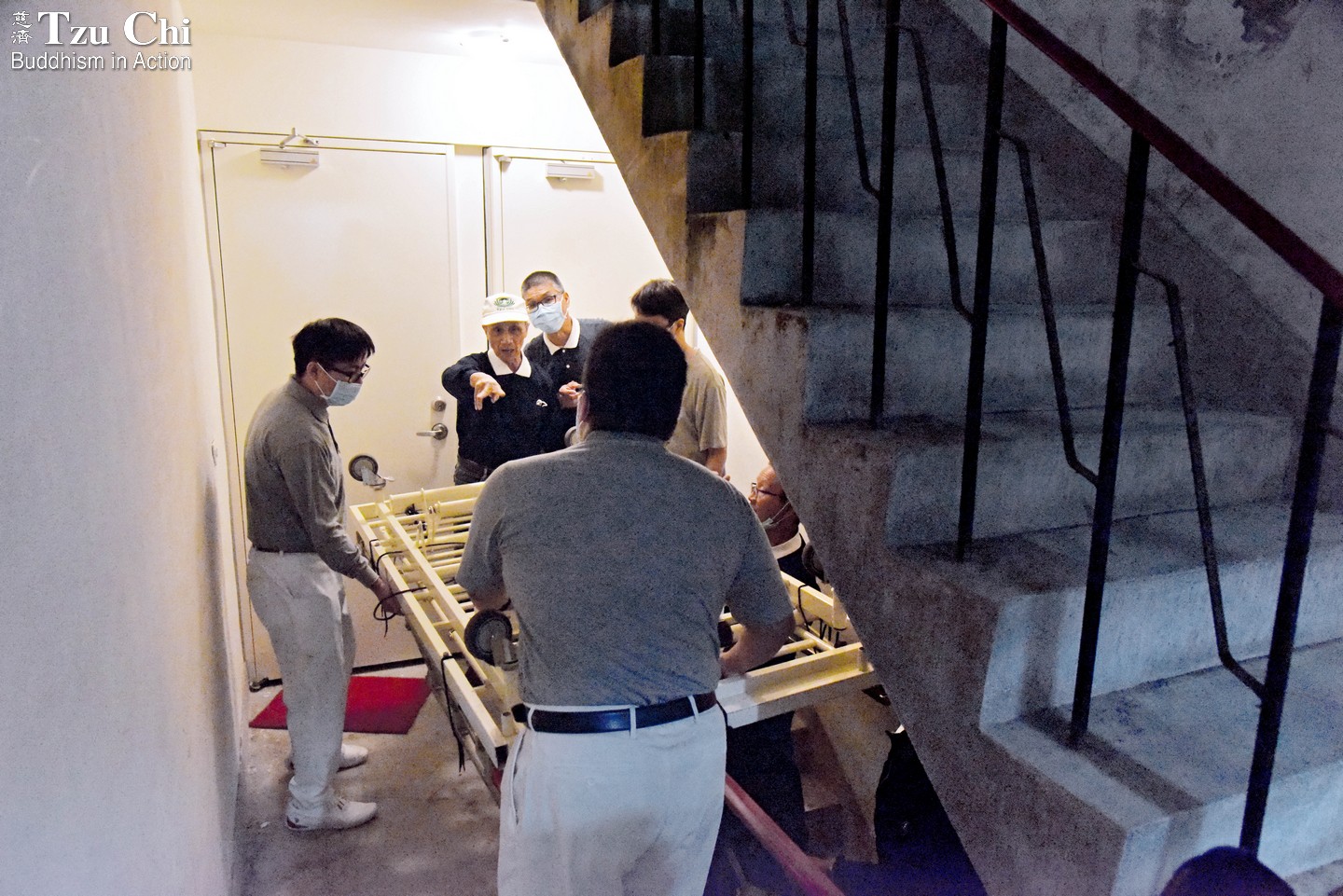By Chen Li-an
Complied and translated by Wu Hsiao-ting
Photos by Hsiao Yiu-hwa
Tzu Chi provides recycled assistive equipment in Taiwan for people with physical limitations. The recycled devices receive a new lease on life and improve the lives of people struggling with everyday activities.

Recycled, well-cleaned assistive equipment waiting to serve functionally impaired people. This equipment is stored in a warehouse on floor B1 of the Bade Jing Si Hall in Taoyuan, northern Taiwan.
Peng Zhen-wei (彭振維) has worked for eight years in a hospital as an emergency room security guard. He often sees the children of patients fighting outside the ER when he’s on duty. During one such clash, he couldn’t help but approach the children angrily arguing with each other and ask, “Your parent is still lying there on the sickbed, and yet you can’t wait to jump into such a fierce argument. What are you fighting for that simply can’t wait?” One of the children responded, “For money.” The other said, “Our dad has fallen ill, but we all have to work. Who’s going to take care of him?”
These sorts of responses are common in this situation. When a loved one experiences a debilitating illness, money can often become an issue. If no one in the family can care for the patient, a care provider may have to be hired to provide essential services. The expenses that follow can be daunting for families of modest means. Another source of financial stress can be the assistive devices required once the patient is discharged from the hospital. For example, a patient might need a combination of assistive devices such as an electric hospital bed, a wheelchair, and a portable toilet chair. They may also require a ventilator or an oxygen concentrator to use at home. Whatever the need is, the resulting cost of such equipment adds to the financial stress of the family.
Chen Mei-hui (陳美慧) is the head nurse in the Stroke Center at Taipei Tzu Chi Hospital, in northern Taiwan. She knows better than most people about the financial impact that long-term care needs can have on a family. “The number of patients aged 55 to 60 that we are admitting has been increasing in recent years,” Chen said. “People in that age group are usually still in the workforce and may even be the breadwinners of their families. When a stroke knocks them down, their families’ finances are bound to be affected.” With their economic situations compromised, such families must budget their expenditures with care. Saving money on things such as assistive devices is a great help in making their ends meet.
Fortunately, the Taiwanese government offers help for such needs. People with mental or physical disabilities can apply for subsidies when they need to purchase assistive devices. Those eligible for long-term care can do the same. However, some families fail to meet the criteria for government aid, even though they are not doing well financially, because they own real estate or can’t qualify as low-income households. Even if they do qualify for aid, “the application process can sometimes take two to three weeks or even longer,” said head nurse Chen. “The wait is simply too long for those patients who are about to be discharged from the hospital and urgently need assistive devices to use at home.”
The government has also, in partnership with private organizations, set up assistive device centers in cities and counties across Taiwan to loan equipment to people needing help. Some of the centers charge rental fees for the equipment; others loan it for free. People can access the services if they have the need.
Peng Zhen-wei, the security guard mentioned at the beginning of this article, pointed out a challenge with getting assistive devices through such centers. “Some families are getting by on as little as 2,000 or 3,000 NT dollars [US$67-100] a month. It’s a challenge for them to even pay the transportation fees for the assistive devices on loan from a center.”
Peng, a Tzu Chi volunteer himself, is therefore happy that the Tzu Chi Foundation has launched an assistive device program, which provides second-hand assistive devices and medical equipment for those who need them. Not only is the equipment provided for free—the delivery is free of charge too. Peng admires the program so much that he has even joined the service.

A volunteer unloads an electric bed and a wheelchair to deliver to a family that has applied to the Tzu Chi assistive device program for the equipment.
How the program came to be
Tzu Chi volunteers discovered a need to offer assistive devices while providing long-term care for disadvantaged families in Hualien and Taitung, eastern Taiwan. These areas cover an expansive, mountainous area, making a visit to an assistive device center difficult for some people. The cost of assistive devices was also an issue. They could range from several thousand to tens of thousands of NT dollars (one U.S. dollar is approximately 30 Taiwanese dollars). Depending on their medical conditions, people might need such equipment for days, weeks, or indefinitely. However long they needed the equipment, it was usually more money than these folks could afford.
It occurred to Tzu Chi volunteers that there were many recycled assistive devices at Tzu Chi recycling stations. People occasionally donated such equipment to the foundation too. Why couldn’t Tzu Chi provide the equipment to those who needed it?
At first, volunteers worked on their own to deliver assistive devices to needy families, but in March 2017 the Tzu Chi Eco-Friendly Assistive Device Program was established in Hualien. Its warehouse is in the basement of the local Tzu Chi Jing Si Hall. The program enables the foundation to integrate resources and services and bring help to more people.
“The launch of such a program was in line with Tzu Chi’s care for the disadvantaged in society,” said Lu Fang-chuan (呂芳川), the director of the Tzu Chi Department of Charity Mission Development. Lu recalled that as soon as the program was set up, Hualien Tzu Chi Hospital submitted many applications. The hospital had many patients about to be discharged who needed wheelchairs, electric beds, or walking aids to make their lives more convenient at home. “When more volunteers discovered how many people needed such a service, they joined on their own initiative to help. This force for good has thus grown more and more powerful.”
Why does the name of Tzu Chi’s assistive device program include the word “eco-friendly”? It’s simple: most of the second-hand assistive devices that have ended up with Tzu Chi are in good condition, and extending their use can help conserve resources and is beneficial for the Earth. Lu explained that before a piece of equipment is sent out, volunteers make sure it has been thoroughly cleaned, sanitized, and is safe to use. As a result, many volunteers have become experts at cleaning, fixing, and maintaining such gear.
The biggest difference between the Tzu Chi program and other assistive device rental centers is that Tzu Chi does not charge any fees, regardless of how many devices a family applies for or how expensive a piece of equipment is. Volunteers process applications as quickly as they can, and even make free deliveries.
Since the program was launched, more and more service outlets have been set up in other areas on the island. Now the program boasts 13 locations in northern, central, and eastern Taiwan with warehouses where assistive devices can be stored, cleaned, and maintained. People who need such equipment can complete application forms online or call one of the program’s dedicated hotlines. Besides delivering equipment to the applicants, volunteers also pick it up when its use is no longer required. As of January 2021, the program had sent out 11,800 pieces of equipment. Electric beds, wheelchairs, and portable toilet chairs are the top three requested items. Other equipment circulating via the program includes walking aids, phlegm suction machines, oxygen concentrators, air mattresses, and other similar items.

A family in which two elderly parents are taking care of a bedridden son has benefited from assistive devices provided by Tzu Chi.
The day the electric bed arrives
“Mrs. Chen, we are here to see you!” called out Ho Yue-peng (何月澎), a Tzu Chi volunteer from Xizhi, northern Taiwan. Mrs. Chen is a Tzu Chi care recipient. Ho and her fellow volunteers visit Mrs. Chen every month.
Ho handed over to Mrs. Chen a huge pack of “gifts.” “I’ve brought some diapers for A-xin,” she said, “and these incontinence pads, smaller than the diapers, are for you.” Ho had picked up the items for Mrs. Chen from a warehouse used by the Tzu Chi assistive device program. The diapers and pads had been generously donated.
Chen uses incontinence pads sparingly to reduce expenses, cutting them in half to double the number of pads. She and her husband live as frugally as they can. Even their three meals consist almost entirely of steamed, stuffed buns given to them by their friends.
Chen, 82, receives only 3,000 NT dollars (US$100) a month from Taiwan’s national pension program. The bulk of their income comes from her 86-year-old husband, who retired from the Taiwan Railways Administration and receives a monthly pension of 25,000 NT dollars (US$835). The couple would have been leading a relatively comfortable retired life if A-xin, their older, single son, had not fallen ill with a brain tumor five years ago. Now bedridden, A-xin can no longer work or even take care of his own daily needs. His in-home care and other needs depleted his savings, and his parents’ pensions fall short of covering the family’s expenses, which include a monthly mortgage payment of 30,000 NT dollars (US$1,000) for their home. Though the couple has another son, he is sitting for an exam and hasn’t started working yet. The family has no choice but to pinch pennies to get by.
Because the Chens own a residential property, they are ineligible for government subsidies for low-income households. With no extra money to spare, the couple can’t afford assistive devices such as an electric bed for A-xin. Before Tzu Chi helped them out, Mrs. Chen would have to prop her son up with several pillows to feed him. When their younger son was home, he’d help them bathe his brother, turn him over in bed, and change his diapers. But when he wasn’t home, the couple had no choice but to manage on their own. Taking care of A-xin, who is taller than either of them, was a real challenge. Even so, Mrs. Chen kept her son very clean, and she did a fine job of running the household.
Still, she was getting old. The older she got, the weaker she became. Her memory also began to show signs of failing. The pressure she was under from having to tend to her son’s needs day in and day out was hard to imagine.
A-xin’s condition took a turn for the worse in 2020. He used to be able to respond to questions in simple sentences, but now he wouldn’t say anything at all. This weighed Mrs. Chen even further down. Seeing her struggle and feeling for her, a friend of 30 years referred the family to Tzu Chi for help.
Volunteers visited the Chens after learning of their situation. They provided the family with emergency financial aid, and applied to the Tzu Chi assistive device program for a wheelchair, toilet chair, and an electric bed for A-xin. They also taught Mrs. Chen some simple massage skills so that she could help relieve A-xin’s discomfort and slow the speed at which his body atrophies.
“I’m really thankful to the volunteers for getting the handy assistive devices for us,” said Mrs. Chen. Even though more than half a year had passed, she still vividly remembered the day the assistive equipment arrived at their home. Volunteers not only moved the devices into A-xin’s room but gave detailed demonstrations of how to use them. They also taught the elderly couple some care techniques that could reduce their chance of injuries while taking care of their son.
Now, with the wheeled toilet chair, the couple finds it easier and safer to transport their son into and out of the bathroom to wash him. The electric bed has also saved Mrs. Chen a lot of hassle. “I no longer have to work so hard to prop him up with pillows to feed him,” she explained. The bed has even seemed to improve A-xin’s mood. Although he is still unable to speak, he looks happier in the bed than before. “He ate a lot for dinner the day the bed was delivered to us!” said Mrs. Chen.

It can be a challenge for a financially stressed family to purchase needed assistive equipment. Even if they can find free equipment to use, transporting it to their home can sometimes be a problem. Tzu Chi’s assistive device program reduces the financial burdens of needy families, arranges for the equipment to be delivered and set up, and extends its useful life.
A more confident caregiver
Another day, volunteers from Keelung, northern Taiwan, delivered a toilet chair and an electric bed to a household located on a hillside in the city. This family’s surname was also Chen. When the volunteers arrived, they broke into two teams: one team helped tidy up the room into which the bed would be placed; the other team cut Mr. Chen’s hair and washed him.
He had been bedridden for six months. His son was his caregiver and the breadwinner of the family. With no prior caregiving experience, the son was overwhelmed by the responsibility of having to care for his severely disabled dad. Tzu Chi volunteers stepped in to help after the family’s plight was brought to their attention.
Mr. Chen hadn’t left his bed in a long time, and his room was disorderly. Volunteers worked with his son to tidy it up, and they fixed a broken light while they were at it. Volunteer Wu Wen-zan (吳文讚) helped set up the electric bed. “We hope Mr. Chen sleeps better on this bed,” he said.
After Mr. Chen had been washed, the volunteers taught the son how to move a bedridden patient. Then they moved Mr. Chen onto the electric bed. Volunteer Wang Xu Mei-li (王許美麗) fixed some rice porridge for the father, who said cheerfully that he hadn’t had this food in a long time.
“I was so flustered when Dad fell ill, I didn’t think I’d be up to the job of caring for him,” the son said. “I’m so grateful to you for stepping in to help.” Learning from the volunteers how to better care for his father rekindled a sense of hope in him. The assistive devices will undoubtedly make his job easier too. “I’ll tend to my dad the best I can when I return home from work, no matter how tired I am. Thank you for giving me the confidence to be a better caregiver.”

Volunteers maneuver an electric bed that weighs over a hundred kilograms (220 pounds) up an old walkup apartment. By the time they reach the applicant’s home on the fourth floor, everyone is covered in sweat. Lai Hui-juan
A rising need
Before Tzu Chi’s assistive device program was even established, volunteer Xie Guo-rong (謝國榮), of New Taipei City, northern Taiwan, had delivered recycled patient beds and other equipment to underserved families for years. He is now a volunteer for the program. During all those years of service, he saw firsthand the benefits that assistive devices could bring caregivers of functionally impaired patients. Without the devices, caregivers could easily injure themselves while caring for someone with special needs. This was especially true if the caregivers themselves were advanced in years or didn’t know the proper techniques for moving or turning an impaired patient. “I often heard from caregivers how, after we had delivered assistive equipment to them, the aches they were experiencing as a result of caregiving had been greatly reduced,” he said.
Xie sighed, adding that older people taking care of older people is now the trend, given Taiwan’s aging population and low birthrates. “Most families that are applying now for our assistive device service consist of people in the 40- to 60-year age group, caring for people in their 70s or 80s,” he explained. He has also come across quite a few instances of older people caring for younger ones.
Xie and other volunteers working for the program often receive urgent delivery requests. For example, one time a mother contacted the program inquiring whether they had a specialty wheelchair for her son. She said that her young son had been afflicted with a rare disease, and that she had used up the financial aid from the government and therefore needed to seek assistance from other sectors. Another instance was a terminally ill elderly man who wished to spend the last days of his life’s journey at home and so urgently needed assistive devices.
Sometimes volunteers deliver assistive equipment to a family only to have to take it back just a few days later because the patient has passed away. They have even delivered equipment to households only to discover that the patients had already died. Despite instances such as these, volunteers serve willingly, without any complaint, glad to be of service to anyone in need.
The original intent of the program was to put recycled assistive equipment to good use by providing it to needy families, but in the course of carrying out their work, volunteers have discovered quite a few families in need of further aid from Tzu Chi. The program has therefore become another channel for foundation volunteers to expand their care to more underprivileged households.
Taiwan is projected to become a super-aged society by the year 2025. (A super-aged society is defined as one in which at least 20 percent of the population is 65 or older.) As the number of functionally impaired people is expected to rise, so will the need for assistive devices. Volunteers will do their best to help address the need, whether by providing care directly or the assistive equipment that families need, so that a better society can be brought into being.



